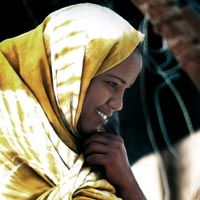 Saharawi Singer Aziza Brahim has a new music video titled La Tierra Derrama Lágrimas (the earth pours tears) filmed by Donal Scannell of Scanarama, from the upcoming album ‘Mabruk’ to be released on June 11.
Saharawi Singer Aziza Brahim has a new music video titled La Tierra Derrama Lágrimas (the earth pours tears) filmed by Donal Scannell of Scanarama, from the upcoming album ‘Mabruk’ to be released on June 11.The only aspiration of Western Sahara people is to return one day to their own country, far away from the Morocco violation.
Navbar
Slid bar
The Occupation We Choose to Ignore’

Do you know who I am? I am a Sahrawi. The land to which I refer is what is known today as the non-self-governing territory ofWestern Sahara. My country was colonized by the Spanish and the French between 1884 and 1975, divided in two and occupied by Moroccan and Mauritanian forces thereafter, and has been ruled exclusively by the Kingdom of Morocco from 1979 until the present.
The Western Sahara: forgotten first source of the Arab Spring

this is one part of the Arab Spring that western governments don't want to talk about. And their silence, and the UN's complicity in it, is why that repression continues, and a terrible injustice is perpetuated.
ISS - News - The Western Sahara and North African People’s Power
Respect the right of individuals to peacefully express their opinions regarding the status and future of the Western Sahara and to document violations of human rights
King of Morocco to be biggest benefactor of EU trade agreement - Telegraph

it has emerged that the single biggest beneficiary of the deal will be the King of Morocco, who is head of one of the three largest agricultural producers in the north African country and lays claim to 12,000 hectares of the nation's most fertile farmland.
North African Dispatches Africa’s Forgotten Colony
Oblivion it seems is the current reality for the arid North African territory of Western Sahara; often referred to as Africa’s ‘Last Colony’. In my opinion, it would be more accurate to describe it as ‘Africa’s Forgotten Colony’.

May 16, 2012
Saharawi Singer Aziza Brahim Releases La Tierra Derrama Lágrimas Music Video | Western Sahara Update
 Saharawi Singer Aziza Brahim has a new music video titled La Tierra Derrama Lágrimas (the earth pours tears) filmed by Donal Scannell of Scanarama, from the upcoming album ‘Mabruk’ to be released on June 11.
Saharawi Singer Aziza Brahim has a new music video titled La Tierra Derrama Lágrimas (the earth pours tears) filmed by Donal Scannell of Scanarama, from the upcoming album ‘Mabruk’ to be released on June 11.
0 comments:
Post a Comment